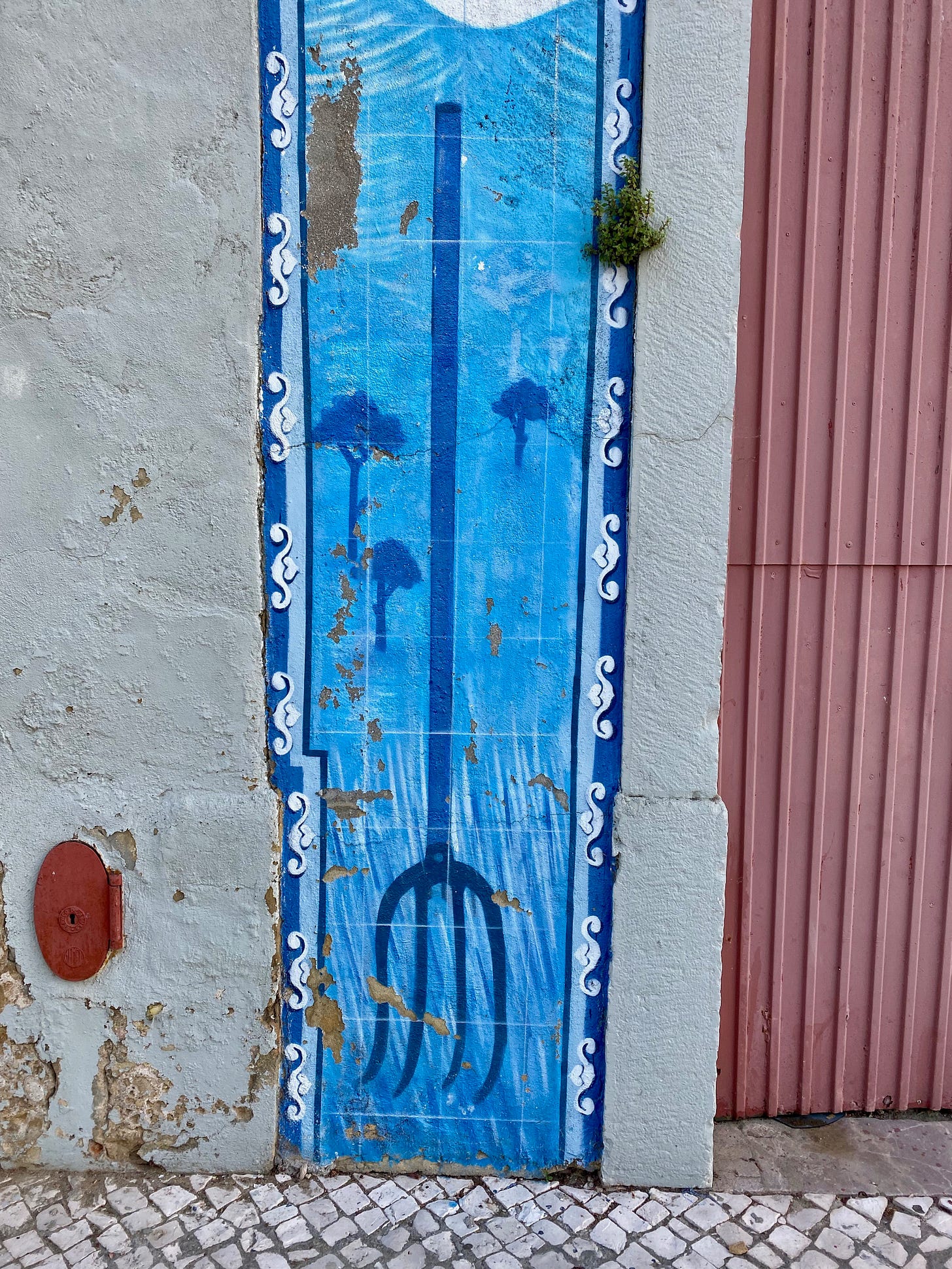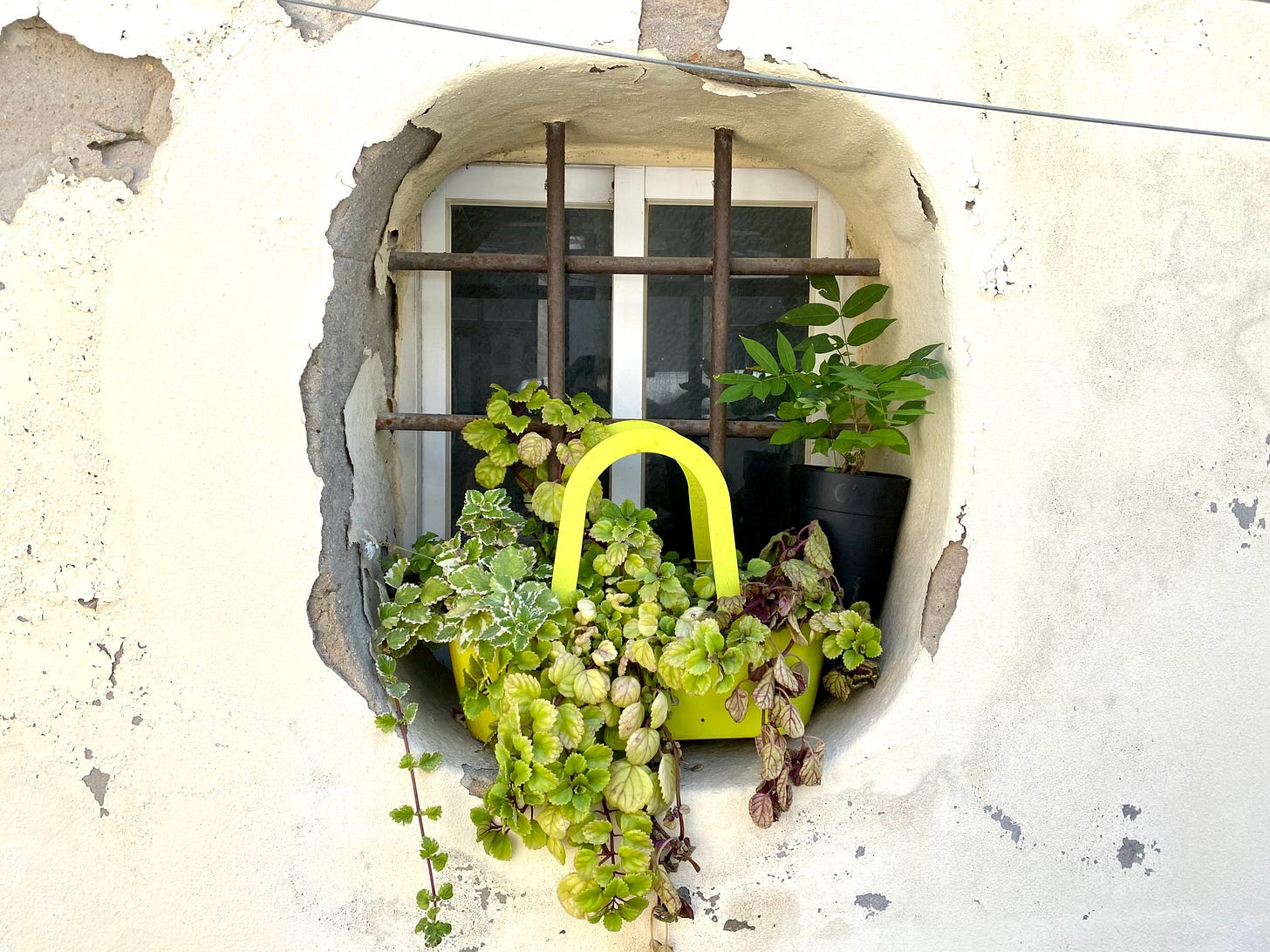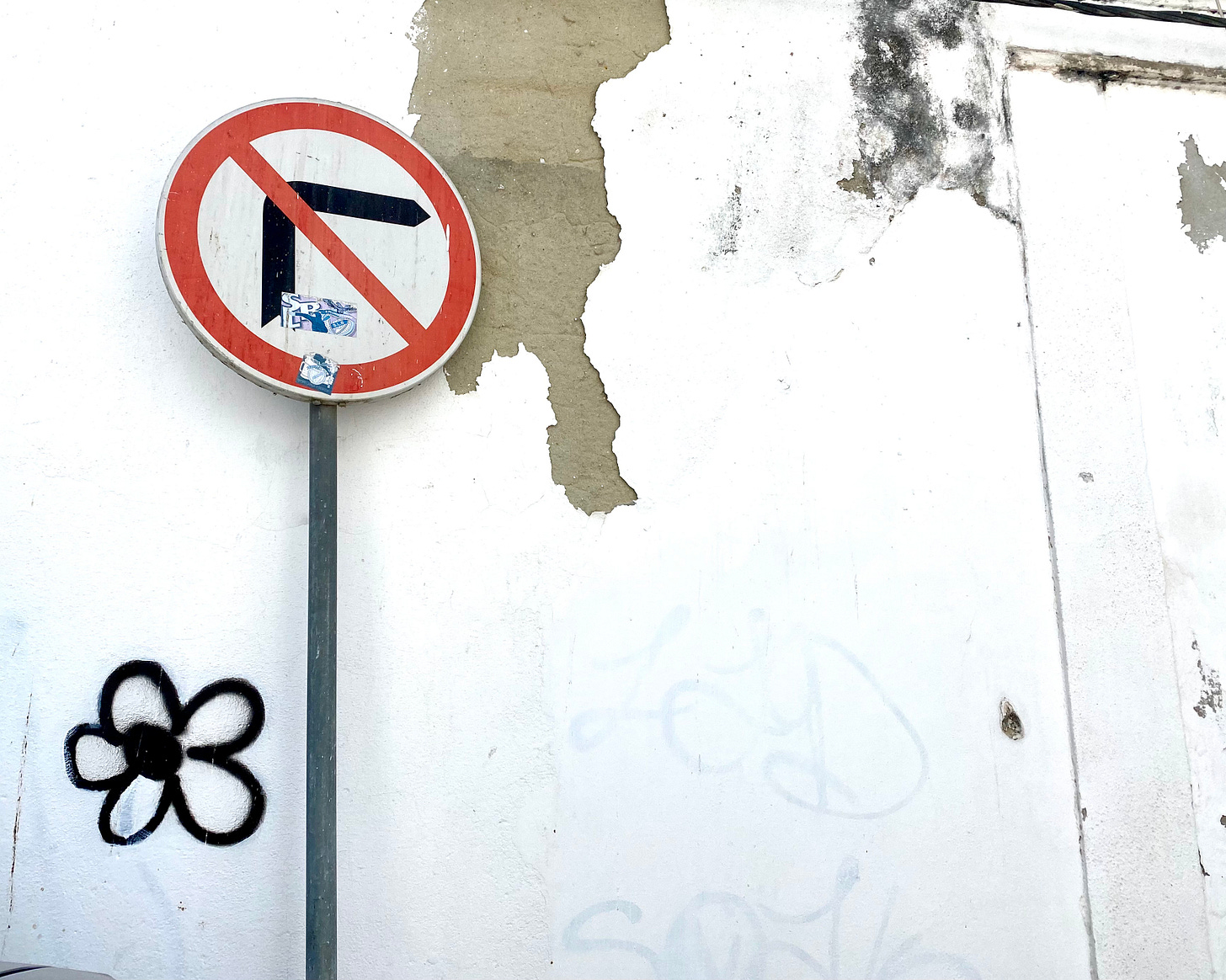Learning to Live without Urgency
The deprogramming is going to take awhile
Turns out, my brain is still American. I was born and bred in the US of A after all, so of course my brain automatically chugs right along those good old star spangled rails.
What I mean by that thesis statement is that I am still laboring under a lifetime of capitalist conditioning. Yes, I have unhitched myself from the yoke of gainful corporate employment; I have removed my body from the American continent whole and entire. I have specifically chosen to live in a country in which the culture churns at a decidedly slower pace. And yet. It is much more difficult than I imagined to stop buzzing around like a good capitalist worker bee.
Here in Europe, the day dawns and, as always, I rise to meet my to-do list. I have always been a list maker. In grade school/junior high/high school, I held my assignment notebooks dear. I would carefully scrawl down my homework and tasks I wanted to accomplish over the weekend. When I was packing up our house in San Francisco, I found a box full of these old assignment notebooks, years and years worth. I flipped through a few of them for a quick rush of nostalgia, then gently filed them in the recycle bin.
Though my lists these days could all be clicks and pixels, I prefer the tactile push of pen against paper as I scratch a line through a done deal. I prefer a notebook I can dog ear and tote around to remind myself that I have shit to do.
I think I’m using the lists to create some sense of structure in my days—which might be a premature impulse, since I can still count the weeks I’ve lived in Portugal on one hand. Also, the shipping container that bears most of our possessions is still en-route. Every morning, I fish a clean pair of pants out of a duffle bag by the side of my bed. We are nowhere close to settled.
So I tell myself it’s ok to not be busy. It’s ok to accomplish just one thing a day—and afterward be exhausted. It’s ok. But I’m not sure my brain believes me. It asks, “Yeah, but what have you done LATELY?”
I have to remember to count the cognitive load of being a stranger in a strange land, of trying to figure out where to go and how to get there and what to do when I do get there, and what words to use, poorly and with apology. (Desculpa!)
My friend KG is a brilliant graphic designer who emigrated from El Salvador to the U.S. a handful of years ago. She has told me of the extra effort it takes for her to get through a day at work—not just as a woman and a person of color, but as an immigrant, speaking in a second language, navigating rules and norms and expectations of a society quite different from the one she knows by heart.
I have a glimpse now, of what she meant. Of the incredible expense of energy that is not seen, only felt.
Even going to the grocery store can be overwhelming. There are so many unfamiliar brands; how do I know which to choose? All the cheese is named differently. The milk is boxed, unrefrigerated, and comes in so many varieties. I stand staring in the aisle for interminable minutes, finally grabbing a selection at random and hoping for the best.
At the petrol station, it’s difficult to remember: gasolina or gasóleo? In the States, the green-handled pump is diesel. Here, it’s gas. If I grab the black handle, I’ll pump a tank full of diesel (gasóleo) and ruin the engine. (I singsong to myself, “Green is good, green is good.”)
Last week, Filha and I went into Lisbon to purchase school uniforms at El Corte Ingles, which is a huge department store not unlike the fancy Macy’s in San Francisco’s Union Square. Before we left, I carefully typed a message into my trusty translator:
"Good morning. I need to purchase school uniforms for my daughter. She is 10, and this is her first time at <name of school>, so she will need to try on the uniforms to determine the right size. Can you help us? Thank you so much."
I hit the “translate” button and printed out the results on a sheet of paper:
"Bom dia. Preciso comprar uniformes escolares para a minha filha. Ela tem 10 anos, e esta é a sua primeira vez no <name da escola>, por isso terá de experimentar os uniformes para determinar o tamanho certo. Pode ajudar-nos? Muito obrigada."
When we got to the store, I figured out that kids’ clothes were on the 4th floor, so we rode the escalators up and up. Once arrived, I couldn’t figure out where the uniforms were. I approached a salesperson for help, but after saying, “Bom dia, uhhhh…” all my words vaporized. Awkwardly, I shoved the piece of paper with my Portuguese translation at her. She peered at it, chuckled to herself, and said in perfect English, “The school uniform counter is that way, along the back wall of the store.”
I thought I was prepared for a lot of difficult things about this new life, but one thing I forgot to prepare myself for was feeling stupid.
My new friend and fellow writer (and fellow Californian-in-Portugal) Shanna nailed it when she said, “From a young age, I’ve always had such facility with language. I can always find exactly the right word. But now, I’m reduced to a 2-year-old or a caveman, pointing at things and saying, “Me. Want. Bread.”
In so many ways here, I am beginning again.
The Work That Can’t Be Seen
This is the first summer I have not had a job since I was, maybe 12? I grew up on a farm, so there were always stalls to muck and hay to bale and beaks to feed. Then I wanted to take horseback riding lessons (at $10 an hour, back in the 80s), so I needed to earn some money. I mowed lawns and scrubbed showers, oiled saddles, and pulled weeds for $2 an hour.
When I turned 16 and could make money on the books, I served up cones and dilly bars at Dairy Queen. I asked, “Would you like fries with that?” at McDonald’s. In college, on summer break, I worked the 2-11pm shift at the same factory that employed my Dad. He was on the 7am-3pm shift in the Tool & Die Department. I packed hinges in plastic bubbles down on the second floor in the packaging department. That money paid for my journalism degree.
Once I had a couple of letters to pin beneath my name, I moved from blue to white-collar work. I was a reporter in a few different Illinois newsrooms until I got tired of asking the parents of children killed in a school bus accident, “How are you feeling? The public has a right to know.”
I toyed with returning to school for a Master’s Degree but had no idea what I’d do with it. Working, for me, was always and only a means to an end. I did it to finance the life I wanted to live in my off-hours.
I had been raised (not so much by my parents, but by my church and religious school) to believe that eventually, of course, I would be someone’s wife. I had a vague idea that I’d stop working whenever I became a Mrs., because wasn’t that how things were done?
But I was a choosy dater and spent a lot of time alone. After university, I wanted to figure out who I was, on my own. Such independence required rent money.
So after ditching journalism, I found another way to get paid for writing words—as a copywriter for a small advertising agency in the Chicago suburbs. This transition launched a career that spanned the next two decades. When I moved to San Francisco in 2000 and the dot com bubble burst (the first time), I moved from ad agency to in-house creative team. That’s where I’ve been ever since. Until two months ago, when I quit my swanky Silicon Valley tech job as Associate Editorial Director and unsubscribed from the rat race.
Although I did pretty well for myself in the corporate world, I’ve never had any genuine ambition or passion for it. All I ever wanted to do was pen poetry. Ride horses. Herd goats. Read novels. But my Dad always told me, “Make sure you get some kind of training in a skill you can use to support yourself.” He was pretty sure poetry wouldn’t pay the bills.
Now, with this transatlantic move, the bills are smaller. I’m not saying poetry will pay all the bills, but I don’t need that fat tech salary anymore. So maybe poetry can pay some of them. Definitely I can work less—and, for this summer at least, I can work not at all.
For the next few months, my work is to adjust. To help Filha adjust. I keep telling myself that’s plenty of work.
But my American capitalist brain pipes up again and blares, “What do you have to show for all this time? What’s on your to-do list? Why haven’t you written a new chapter for your book? Why does it take you two weeks to write a new blog post? You haven’t made any headway on your book proposal! What is wrong with you?!”
As I was berating myself for my lack of word count in my (zoom) writing group the other day, my (very wise) friend L sent me a quote that said, “Every dead body on Mt. Everest was once a highly motivated person, so… maybe calm down.”
Dream Like a Plant
I’m trying to calm down, and to think of productivity differently—as I’m trying to think of so many aspects of life differently these days. To recognize that though the work I’m doing can’t been seen right now, it’s still happening. I’m growing and learning and soaking up the sun. Someday I will have something to show for it.
I came across this post somewhere on social media and saved it so I could take it to heart. It feels very apropos here:
(The image reads: “I think part of the issue is people assuming that everyone MUST want to move upwards. Like…it’s the next logical step for a person to want to move up the chain: from worker to manager, to district manager, eventually owner. But I always think of growth like plants. Aspens grow tall to reach the sun, for sure. But dandelions grow deep, understanding themselves fully so that if some misguided fool tries to uproot them, they’d have to try damn hard. And then there’s thyme and other creeping plants, which spread themselves out so much that if you chop a part of it off, it roots wherever it can find dirt to root in. It’s okay not to have lofty dreams. You know what kind of plant you are better than anyone else.”)
I don’t think I would mind being a dandelion instead of a worker bee. Burrowing my roots deep, deep in the earth. Understanding myself fully. Occasionally turning my bright head to ephemeral puffs of white. Seedlings of ideas, of stories, of words that catch the wind and fly aloft and away to find purchase in some other soil, in some other heart. And take root there. And bloom.
P.S. Update from my Trial Period post
My Mom is doing better. She is out of the hospital, out of rehab, and doing quite a bit of adjusting of her own. She gets around with the aid of a walker and a motorized scooter, and is under strict instructions to Be Careful. My sister and her family have been with my parents this whole time, but they are heading back to California soon. But my cousin P in Indiana is still keeping tabs on the situation, and my Dad’s employer has converted two offices into a living room and bedroom for my Mom. The plan is that she’ll go to work with my Dad, hang out in comfort and style, and then they’ll head home together at the end of the day. She won’t be alone. And I’ll get there to check in as soon as I can.
Copyright © 2021 LaDonna Witmer








All of your recent writing has resonated with me, this one in particular, on so very many levels.
As context, it's 8:40 pm and I just finished my day. I started at 7:30 this morning, because we were launching something new on our company website that I was project managing. After I fired off a few emails to the web developer, I took Bibi out for a run. Along the way, I stopped several times to reply back to the web developer, who was troubleshooting over breakfast. When I got home from the run, I frantically worked to iron out the remaining kinks in the project, and finally finished around 10:30. At that point, I had to immediately switch gears to another project that is launching tomorrow. Five hours later, that was wrapped up and I switched gears once again, to a project that we actually finished yesterday but that was unfortunately overwritten by our web developer due to their internal miscommunication, and so we had to redo that work. When that was done, I switched gears yet again, this time to a report that my boss asked me for two weeks ago but that I never have time to do because I am working on so many other things. And when I finally signed off, after 7:30, I had several things still on today's To Do List that I hadn't touched, but I had to quick eat dinner (chips and salsa was the daily special), hang up my laundry, and walk the dog. And that is how I spent the last 13 hours: as a good capitalist worker bee. I think you can see why I, too, would like to live without urgency, and why it will indeed take deprogramming if I'm ever to do so. I'm almost 50, FFS, and I no longer want to climb the ladder; I want to take a nap.
Keep writing; you've got a good thing going here.
We are indeed a product of our capitalist culture that rewards "rugged individualism" which is American jargon for "work your ass off!". We live duped by the myth that if you work hard, you'll get ahead. We never learned to question what "get ahead" means. Thanks for the reminder to chill the F out.